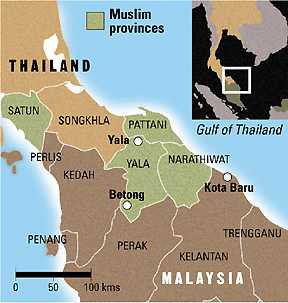David L. Chaplin II
Impunity Watch, Asia
YALA, Thailand – Yala has been under emergency rule since 2005. More than 4,400 people have died from what seems like daily attacks. Fighters in Thailand’s south have waged a violent campaign since 2004.

While the international media focuses on Red and Yellow Shirt clashes and a temple spat, a deadly rebellion still brews in Thailand’s south.
Insurgents have intensified their attacks in the lower South in the hope of attracting the intervention of the Organization of the Islamic Conference, says army commander-in-chief Prayuth Chan-ocha.
Thailand is on the brink of political crisis as the separatist rebellion in the country’s south has largely escaped international attention. Its seventh anniversary passed quietly, with little mention.
Major shooting and bomb attacks, since the start of the year, are being seen as an attempt by separatists to intensify the violence in a bid to highlight Thailand’s southern insurgency.
The army chief said more surveillance cameras must be installed as they could help identify rebels perpetrating violence.
A call for more residents of the South to become the eyes and ears of the state as Gen Prayuth said tighter security measures would be implemented.
The army is concerned for the safety of people who might be harmed by insurgents for cooperating with authorities.
The Thai government extended emergency rule in the country’s south for an additional three months, despite rights groups being concerned about the powers the law gives the military.
The commander-in-chief said the army was handling the insurgency problem through a multi-dimensional approach using the justice system, military strategies and development projects.
Gen Prayuth said the army might have to go on the offensive and try harder to locate militants in hiding in the mountains and around towns.
“We will not fall for the [militants’] tricks,” the army chief said.
“We will do our best by invoking the law and by solving our own internal problem.”
The more progress officials make and the more support they gain from local people, the more militants will intensify their attacks.
Meanwhile, police have linked a key member of the militant Runda Kumpulan Kecil separatist movement to Monday’s motorcycle bomb attack in Yala in which 18 people were injured.
The man was identified as Aumran Ming, an RKK group leader who lives in Narathiwat’s Rangae district, said provincial police Chief Chaitat Inthanujit.
Mr. Aumran is wanted for involvement in many violent attacks against authorities and civilians since 2003.
A sad truth is that, February was just another month in southern Thailand.
Most of the past seven years, the authorities have decided to dismiss the attacks as random acts of violence carried out by either bandits or a handful of disgruntled Islamic militants.
Five years passed before the Thai police admitted they had a separatist movement on their hands, a well-structured organization consisting of five related groups operating across four provinces—Songkhla, Yala, Pattani and Narathiwat—where six million Muslims live.
This is about more than just some obscure provincial groupings, there has also been evidence of links with al-Qaeda and regional terrorist outfits like Jemaah Islamiyah.
‘What’s happening in Pattani isn’t an internal conflict, some (fighters) come from the neighboring country, some come from far away, many thousands of miles,’ he has said, while urging Muslims in Malaysia and Indonesia to join Jemmah Islamiyahs jihad.
For more information, please see:
The Diplomat – Thailand’s Forgotten Conflict – 24 February 2011
Bangkok Post – Prayuth says rebels hope to draw in OIC – 24 February 2011
Al Jazeera – Car bomb hits southern Thailand – 13 February 2011


 Kim unlikely to be affected by Egyptian Revolution due to information control (Photo courtesy of AP)
Kim unlikely to be affected by Egyptian Revolution due to information control (Photo courtesy of AP)